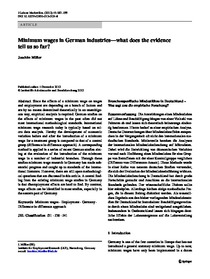Minimum wages in German industries. What does the evidence tell us so far?

Journal for Labour Market Research
2012
45
3/4
December
187-199
employment ; industrial sector ; minimum wage
Wages and wage payment systems
https://doi.org/10.1007/s12651-012-0124-8
English
Bibliogr.
"Since the effects of a minimum wage on wages and employment are depending on a bunch of factors and are by no means determined theoretically in an unambiguous way, empirical analysis is required. German studies on the effects of minimum wages in the past often did not meet international methodological standards. International minimum wage research today is typically based on micro data analysis. Hereby the development of economic variables before and after the introduction of a minimum wage for a treatment group is compared to that of a control group (difference-in-difference approach). A corresponding method is applied in a series of recent German studies aiming at the evaluation of the introduction of the minimum wage in a number of industrial branches. Through these studies minimum wage research in Germany has made substantial progress and caught up to standards of the international literature. However, there are still open methodological questions that are discussed in this article. A central finding from the existing minimum wage studies in Germany is that disemployment effects are hard to find. By contrast, wage effects can be identified in most studies, especially in the eastern part of Germany."
Digital
The ETUI is co-funded by the European Union. Views and opinions expressed are however those of the author(s) only and do not necessarily reflect those of the European Union or the ETUI.